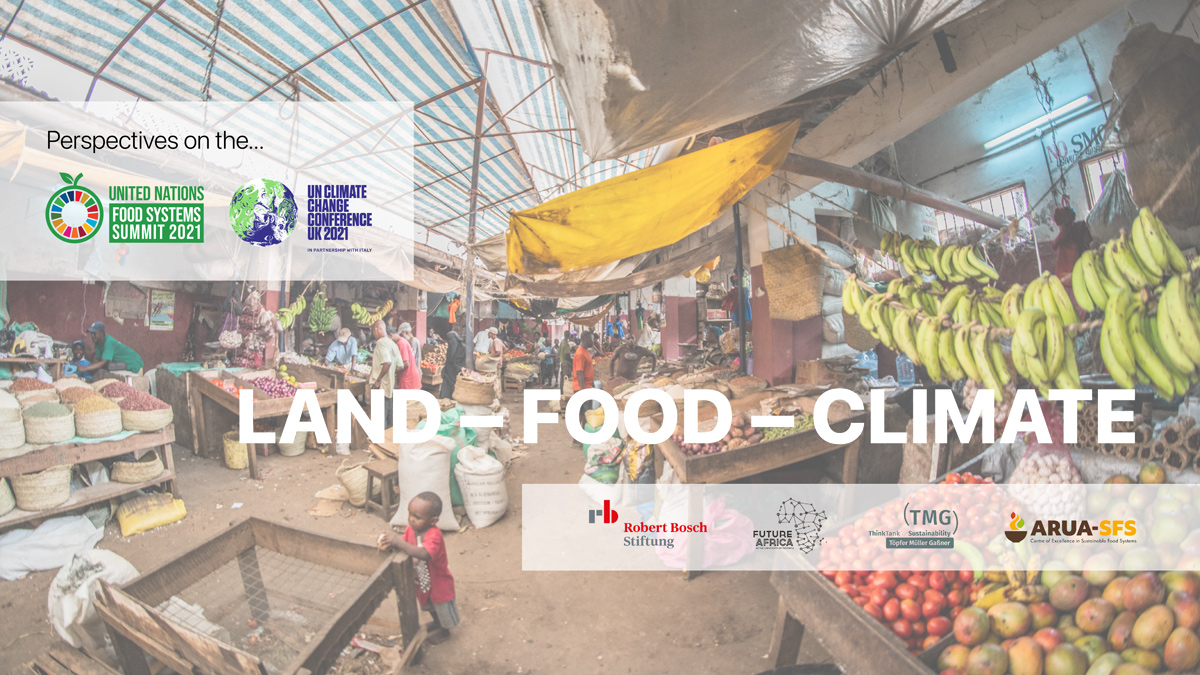Discussion
Land-Food-Climate: Tackling the climate implementation gap
Are rights the “missing middle”?
Terre-Alimentation-Climat: S'attaquer à l'écart de mise en œuvre de mesures climatique - Les droits sont-ils le « chaînon manquant »

Smallholder farmers, pastoralists, the urban poor, and other vulnerable groups in Africa, are already paying a disproportionate share of the cost for accelerated climate change. Addressing their needs while protecting Africa's rich biodiversity is too daunting a challenge for individual projects, programmes, or even governments. Against the backdrop of a global pandemic that has further deepened inequalities, "and risks sending over 70 million people into extreme poverty," international partnerships have an important role to play.
Building on preceding discussions that highlighted the importance of the progressive realisation of the right to food to achieve climate resilience, this event will bring together speakers from the human rights, climate, research, and development cooperation sectors to further explore how international partnerships can help galvanise more inclusive climate governance at the national and sub-national levels in Africa.
The Earth Negotiations Bulletin of the IISD will provide web coverage of the event.
Please note that the link to access the event is automatically sent after registration. If you do not see the email in your inbox, check your “junk mail” folder or “spam” folder.
Les petits exploitants agricoles, les éleveurs, les populations urbaines défavorisées et d'autres groupes vulnérables en Afrique paient déjà une part disproportionnée du coût de l'accélération du changement climatique. Répondre à leurs besoins tout en protégeant la riche biodiversité de l'Afrique est un défi trop difficile à relever pour les projets et programmes individuels, voire pour les gouvernements. Dans le contexte d'une pandémie mondiale qui a encore creusé les inégalités "et risque de faire basculer plus de 70 millions de personnes dans l'extrême pauvreté", les partenariats internationaux ont un rôle important à jouer.
S'appuyant sur les discussions précédentes qui ont souligné l'importance de la réalisation progressive du droit à l'alimentation pour atteindre la résilience climatique, cet événement réunira des intervenants des secteurs des droits de l'homme, du climat, de la recherche et de la coopération au développement pour explorer la manière dont les partenariats internationaux peuvent contribuer à galvaniser une gouvernance climatique plus inclusive aux niveaux national et sous-national en Afrique.
Veuillez noter que le lien pour accéder à l'événement est envoyé automatiquement après l'inscription. Si vous ne voyez pas l'e-mail dans votre boîte de réception, vérifiez votre dossier "courrier indésirable" ou "spam".
"Our children are learning under trees. Communities displaced daily by lakes have no one to turn to. The poor are getting poorer. Food is scarce. Water is scarce. (…) Power is conferred by the people. Power must be used only for the benefit of the people.” Linda Katiba (Protect the Constitution) Coalition, Kenya
2022 will mark the 30th anniversary of the first “Earth Summit” that gave rise to three “sister“ Rio environmental Conventions focusing on land degradation, biodiversity, and climate change. With the adoption of the 2030 Agenda on Sustainable Development in 2015, the international community took a further step towards building an overarching framework for addressing human and planetary resilience.
Despite this achievement, progress towards agreed global targets remains seriously offtrack. The Sustainable Development Goals Report 2020 expressed particular concern about rising food insecurity, alarming rates of environmental degradation, and the persistence of “dramatic levels of inequality” in all regions. Against the backdrop of a global pandemic that has further deepened these inequalities, “and risks sending over 70 million people into extreme poverty,” there is increased recognition that getting the SDGs back on track and preventing the worst impacts of climate change requires transformative multistakeholder action at unprecedented scales.
Yet a growing number of analyses apportion a large part of the blame for the lack of progress to the governance gap – or “missing middle” – between national and global ambitions and the realities of local communities who bear the brunt of climate impacts. The 2019 State of the Climate in Africa report found that the first generation of African Nationally Determined Contributions had “little or no cross-sectoral consultation, even less consultation with other stakeholders such as the private sector, labour and communities, and largely assumed the availability of international financing for their implementation.”
Smallholder farmers, pastoralists, the urban poor, and other vulnerable groups in Africa, are already paying a disproportionate share of the price for accelerated climate change. Addressing their needs while protecting Africa’s rich biodiversity is too daunting a challenge for individual projects, programmes, or even governments. By supporting nature-based solutions such as the expansion of agroecological approaches or restoring degraded landscapes for agriculture and other productive uses, international partnerships can help to create alliances across land, food, and climate change communities that are critical in building climate-resilient landscapes.
Event synopsis
Building on preceding discussions that highlighted the importance of the progressive realisation of the right to food to achieve climate resilience, this event will bring together speakers from the human rights, climate, research, and development cooperation sectors to further explore how international partnerships can galvanise more inclusive climate governance at national and sub-national levels.
Organised around two interactive panel sessions, the discussions will start by exploring what we mean by the “missing middle” and its impact on efforts to scale up climate-resilient landscapes in Africa. Drawing on good practices, as well as “cautionary tales” from international climate cooperation in a number of country contexts, speakers will further highlight the role of inclusive local governance processes in bridging this implementation gap. A closing synthesis session will highlight some necessary elements for building transforming partnerships between African and European stakeholders in order to contribute towards bridging this gap.
Land-Food-Climate: An African-European Dialogue on Climate Resilience
Teaser video for the "Land-Food-Climate: An African-European Dialogue on Climate Resilience" event series
Sep 13, 2021
Land-Food-Climate: Tackling the climate implementation gap
Second event of the series "Land-Food-Climate: An African-European Dialogue on Climate Resilience"
Oct 19, 2021

Antoine Oger
Institute for European Environmental Policy

Cheikh Mbow
Future Africa, University of Pretoria

Corinna Enders
Zukunft, Umwelt, Gesellschaft

Faith Alubbe
Kenya Land Alliance

Harouna Bary
Groupe de Recherche et d’Action sur le Foncier (GRAF)

Kumi Naidoo
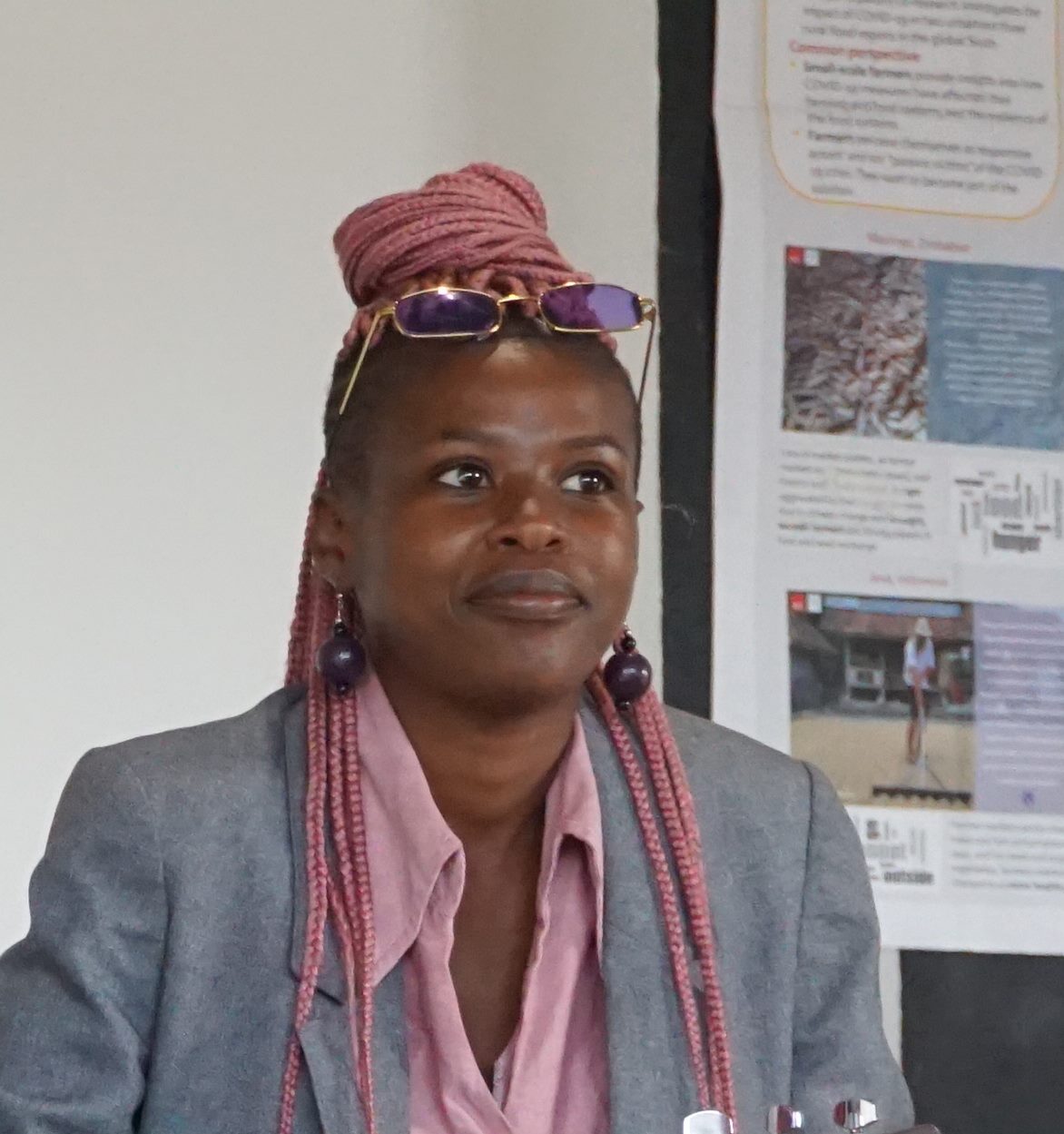
Sanelisiwe (Mimi) Nyaba
Food Agency Cape Town

Susan Chomba
World Resources Institute
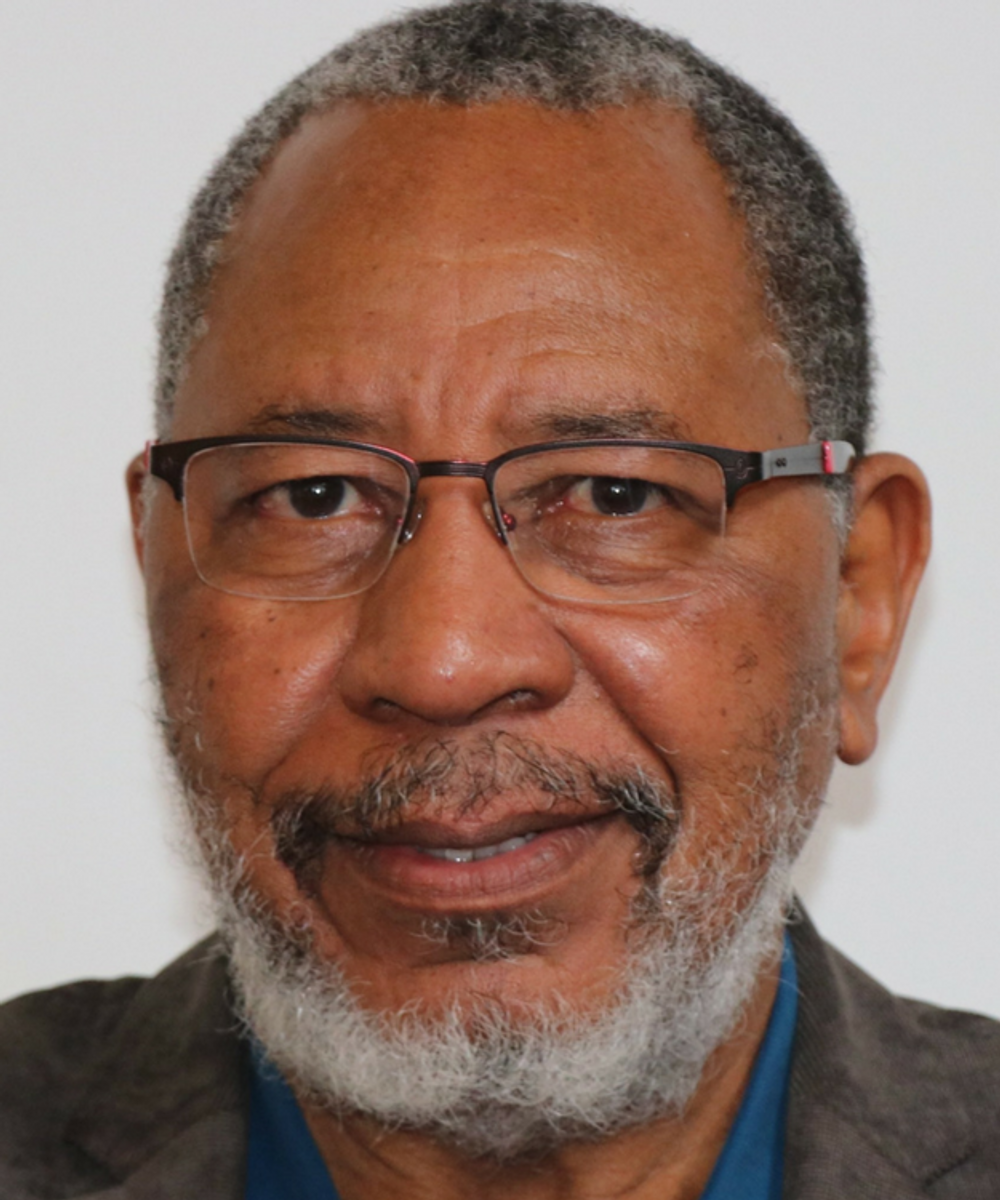
Youba Sokona
South Centre
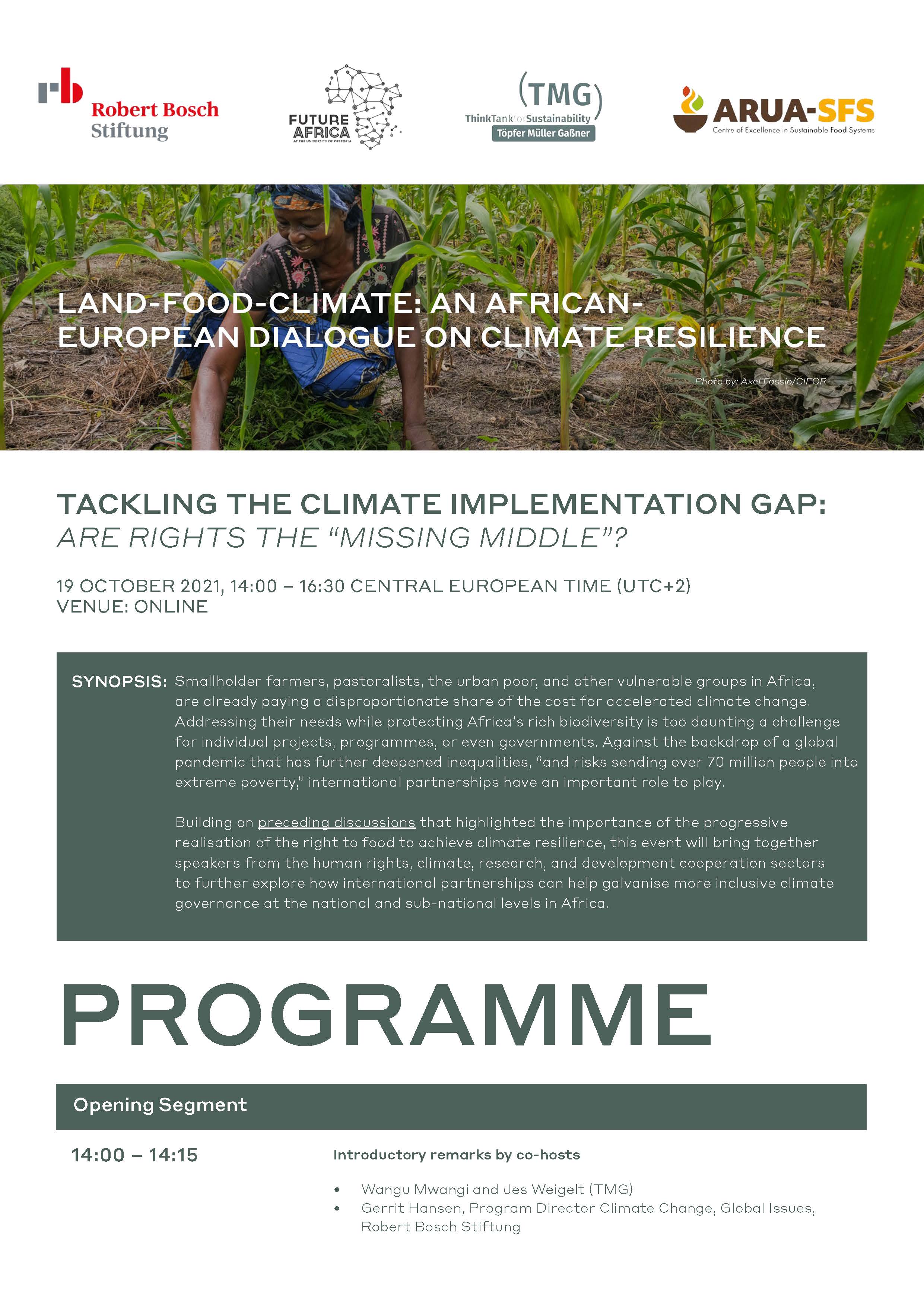
Event Programme
Land-Food-Climate: Tackling the climate implementation gap
Programme for the forthcoming event, Land-Food-Climate: Tackling the Climate Implementation Gap
Written by TMG Research, Robert Bosch Stiftung
Published on Oct 06, 2021
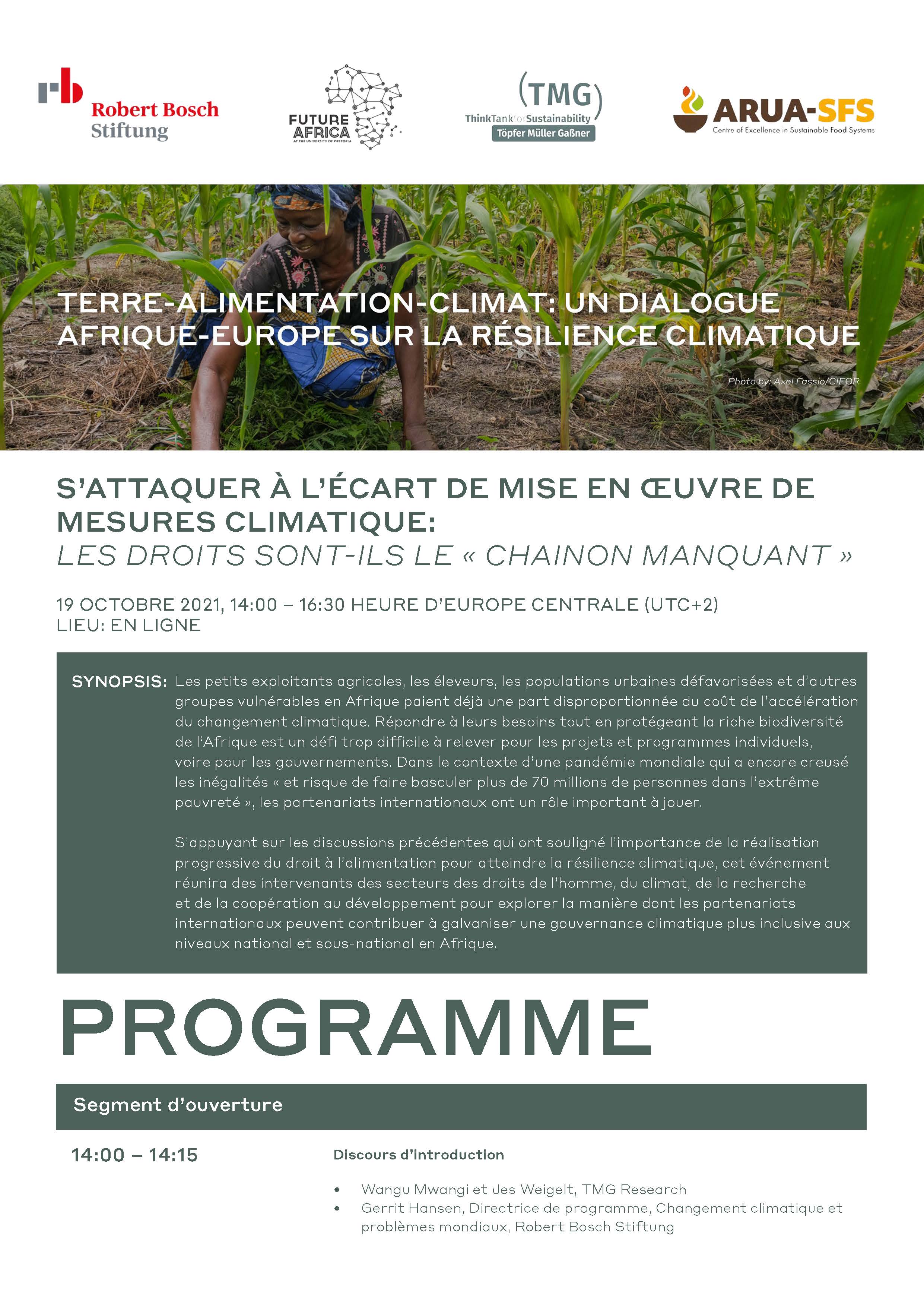
Event Programme
Terre-Alimentation-Climat : Un dialogue Afrique-Europe sur la résilience climatique
Programme de l'événement à venir, Terre-Alimentation-Climat : Un dialogue Afrique-Europe sur la résilience climatique
Written by TMG Research, Robert Bosch Stiftung
Published on Oct 06, 2021
